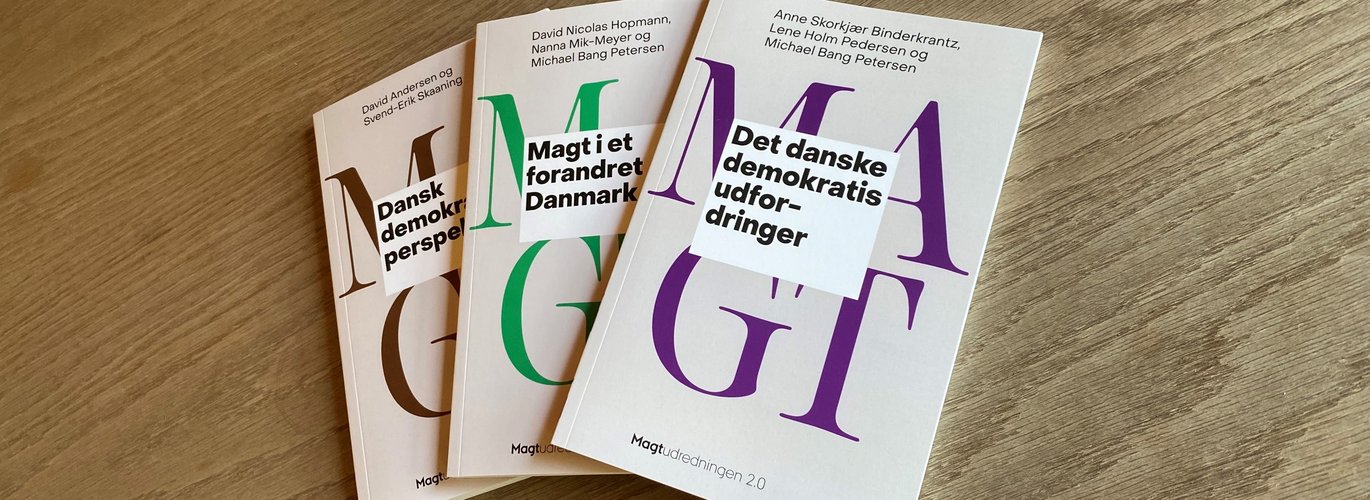Democracy and Power Study 2.0: Our democracy is vulnerable
Danish democracy is challenged. This is the message from the initial work of the Democracy and Power Study 2.0 project, commissioned by the Danish Parliament. The challenges concern citizen engagement in democratic processes, the quality of the public dialogue and the pressure on the political decision-making system.

“The need to take a closer look at our democracy and discuss ways of strengthening it is more urgent today than I had imagined when we started the project,” says Michael Bang Petersen, head of the research team leadership for Democracy and Power Study 2.0, and professor at the Department of Political Science at Aarhus BSS, Aarhus University.
In 2022, the Danish Parliament decided that the state of Danish democracy should be thoroughly analysed by independent researchers. A new study of democracy and power in Denmark was needed because of the major changes that had taken place in society since the last democracy and power study done around the around the turn of the millennium.
After preliminary work involving more than 200 researchers from Danish universities, the initial results of the new democracy and power study are now being published.
Today sees the publication of the first three books in a book series from the Democracy and Power Study 2.0, and the overall conclusion is clear: Danish democracy is challenged.
It’s important that we take the challenges facing Danish democracy seriously if we want to ensure that it remains robust in the future
Professor Michael Bang Petersen,Departmernt of Political Science, Aarhus University, head of the research team leadership for Democracy and Power Study 2.0
Internal and external challenges
While democracies are under pressure around the world, researchers have identified a number of weaknesses in our own democracy. The core of Danish democracy remains intact, but the quality of the public dialogue is challenged by the logic and algorithms of social platforms. Political processes are less transparent and more centralised than before. Large groups of people do not feel part of society, partly due to increasing levels of inequality. And many of our democratic institutions rely more on informal traditions and norms than formal rules.
"It’s important that we take the challenges facing Danish democracy seriously if we want to ensure that it remains robust in the future. Based on our current knowledge, we believe that Danish democracy may eventually come to be affected by developments like the ones we’re currently seeing around the world, where democracy is under pressure both in young democracies close to us, such as Hungary, and in one of the world’s oldest democracies, the United States,” says Michael Bang Petersen, who heads the Democracy and Power Study 2.0 in collaboration with four colleagues from the University of Copenhagen, the University of Southern Denmark, Copenhagen Business School and Aarhus University.
Debate and research side by side
The Democracy and Power Study 2.0 project will produce a final report in 2028, which will set out the research team leadership’s final conclusions. Until then, 45 books in total will be published. In the remaining books in the series, Danish researchers with expertise in a multitude of fields will scrutinise different aspects of democracy to help us understand the individual challenges and how to possibly overcome them.
The books are written for the general public and intended to provide a science-based foundation for the ongoing public debate.
“We want to stress that what we’re presenting today are the results of our preliminary work. Not our definitive conclusions. We’re inviting a public debate of our preliminary results because we need input on what we may be overlooking as we dive into the various problems and challenges in order to learn more about them and assess how serious they are,” says Michael Bang Petersen.
And there is a need for us as a society to think in new ways, according to Michael Bang Petersen.
“We cannot take Danish democracy for granted. For it to remain viable in the 21st century, citizens and decision-makers need to ensure new ways are found of delivering on the most important democratic tasks,” says the professor from Aarhus University.
Facts
We strive to comply with Universities Denmark’s principles for good research communication. For this reason, we provide the following information as a supplement to this article:
Type of study | The books are based on extensive source material in the form of existing research, international democracy databases, a survey, interviews with political players and workshops involving more than 200 researchers. |
| External partners | More than 70 researchers from Danish research institutions will contribute to the Democracy and Power Study 2.0 book series. In addition to Michael Bang Petersen, the research team leadership consists of Anne Skorkjær Binderkrantz from Aarhus University, Nanna Mik-Meyer from CBS, David Nicolas Hopmann from the University of Southern Denmark and Lene Holm Pedersen from the University of Copenhagen. |
| External funding | The Danish Parliament |
| Conflict of interests | Michael Bang Petersen has been appointed by the Minister for Higher Education and Science as research group leader and has appointed the rest of the research team leadership. The Ministry of Higher Education and Science has set up an advisory group for the project, but the research leadership is independent. |
| Other | No |
| Link to scientific article | The analyses have not been published as articles in scientific journals, but as peer-reviewed books. The e-books are freely available (in Danish) here:
Working titles of upcoming books can be found here. |
| Contact information | Michael Bang Petersen |